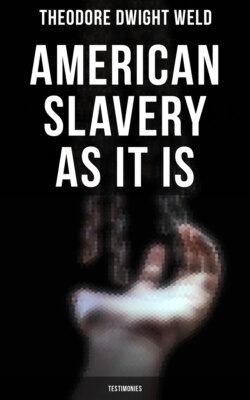Читать книгу American Slavery as It is: Testimonies - Theodore Dwight Weld - Страница 20
На сайте Литреса книга снята с продажи.
1. KINDS OF FOOD.
Оглавление| Hon. Robert Turnbull, a slaveholder of Charleston, South Carolina. | "The subsistence of the slaves consists, from March until August, of corn ground into grits, or meal, made into what is called hominy, or baked into corn bread. The other six months, they are fed upon the sweet potatoe. Meat, when given, is only by way of indulgence or favor." |
| Mr. Eleazar Powell, Chippewa, Beaver Co., Penn., who resided in Mississippi, in 1836-7. | "The food of the slaves was generally corn bread, and sometimesmeat or molasses." |
| Reuben G. Macy, a member of the Society of Friends, Hudson, N. Y., who resided in South Carolina. | "The slaves had no food allowed them besides corn, excepting at Christmas, when they had beef." |
| Mr. William Leftwich, a native of Virginia, and recently of Madison Co., Alabama, now member, of the Presbyterian Church, Delhi, Ohio. | "On my uncle's plantation, the food of the slaves, was corn pone and a small allowance of meat." |
WILLIAM LADD, Esq., of Minot, Me., president of the American Peace Society, and formerly a slaveholder of Florida, gives the following testimony as to the allowance of food to slaves.
"The usual food of the slaves was corn, with a modicum of salt. In some cases the master allowed no salt, but the slaves boiled the sea water for salt in their little pots. For about eight days near Christmas, i. e., from the Saturday evening before, to the Sunday evening after Christmas day, they were allowed some meat. They always with one single exception ground their corn in a hand-mill, and cooked their food themselves.
Extract of a letter from Rev. D. C. EASTMAN, a preacher of the Methodist Episcopal church, in Fayette county, Ohio.
"In March, 1838, Mr. Thomas Larrimer, a deacon of the Presbyterian church in Blooming-bury, Fayette county, Ohio, Mr. G. S. Fullerton, merchant, and member of the same church, and Mr. William A. Ustick, and elder of the same church, spent a night with a Mr. Shepherd, about 30 miles North of Charleston, S. C., on the Monk's corner road. He owned five families of negroes, who, he said, were fed from the same meal and meat tubs as himself, but that 99 out of a 100 of all the slaves in that county saw meat but once a year, which was on Christmas holidays."
As an illustration of the inhuman experiments sometimes tried upon slaves, in respect to the kind as well as the quality and quantity of their food, we solicit the attention of the reader to the testimony of the late General Wade Hampton, of South Carolina. General Hampton was for some time commander in chief of the army on the Canada frontier during the last war, and at the time of his death, about three years since, was the largest slaveholder in the United States. The General's testimony is contained in the following extract of a letter, just received from a distinguished clergymen in the west, extensively known both as a preacher and a writer. His name is with the executive committee of the American Anti-Slavery Society.
"You refer in your letter to a statement made to you while in this place, respecting the late General Wade Hampton, of South Carolina, and task me to write out for you the circumstances of the case--considering them well calculated to illustrate two points in the history of slavery: 1st, That the habit of slaveholding dreadfully blunts the feelings toward the slave, producing such insensibility that his sufferings and death are regarded with indifference. 2d, That the slave often has insufficient food, both in quantity and quality.
"I received my information from a lady in the west of high respectability and great moral worth,--but think it best to withhold her name, although the statement was not made in confidence.
"My informant stated that she sat at dinner once in company with General Wade Hampton, and several others; that the conversation turned upon the treatment of their servants, &c.; when the General undertook to entertain the company with the relation of an experiment he had made in the feeding of his slaves on cotton seed. He said that he first mingled one-fourth cotton seed with three-fourths corn, on which they seemed to thrive tolerably well; that he then had measured out to them equal quantities of each, which did not seem to produce any important change; afterwards he increased the quantity of cotton seed to three-fourths, mingled with one-fourth corn, and then he declared, with an oath, that 'they died like rotten sheep!!' It is but justice to the lady to state that she spoke of his conduct with the utmost indignation; and she mentioned also that he received no countenance from the company present, but that all seemed to look at each other with astonishment. I give it to you just as I received it from one who was present, and whose character for veracity is unquestionable.
"It is proper to add that I had previously formed an acquaintance with Dr. Witherspoon, now of Alabama, if alive; whose former residence was in South Carolina; from whom I received a particular account of the manner of feeding and treating slaves on the plantations of General Wade Hampton, and others in the same part of the State; and certainly no one could listen to the recital without concluding that such masters and overseers as he described must have hearts like the nether millstone. The cotton seed experiment I had heard of before also, as having been made in other parts of the south; consequently, I was prepared to receive as true the above statement, even if I had not been so well acquainted with the high character of my informant."
